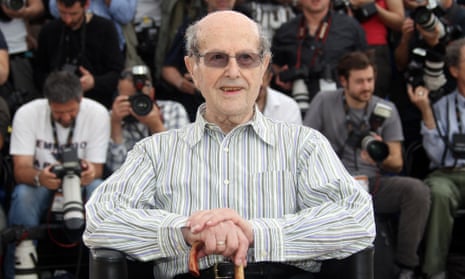The first time I laid eyes on Manoel de Oliveira would have been way back in 1999; he was just 90 years old. It was at the Cannes film festival, where he was presenting his film, The Letter, in competition. The great man was announced by name as he entered the Grand Théâtre Lumière with his équipe for the official black-tie gala — part of the festival’s auteurist tradition. I craned my neck to get a glimpse of this near-legendary director. Would he be a tiny, wizened figure, dwarfed by the tanned Eurotrashy demi-monde that always seems to collect at Cannes occasions like these? Would he walk with a stick? In a wheelchair? Prostrate on a gurney with a nurse in tow?
Not a bit of it. De Oliveira was bald, tanned, vigorous-looking – like a retired bull-fighter in his early 60s. Later, a friend showed me a publicity still from the set of the film that he was currently working on: having apparently supervised an aerial shot, De Oliveira was athletically leaping from a lowered camera-crane to the ground.
This remarkable Portuguese film-maker was a virtual folk-memory of cinema history – from 2008 onwards he was the oldest working director, a man whose active career began in 1927, in the silent age, and continued to the present day – although interrupted by periods of enforced inactivity and retirement due to critical indifference and to the philistinism and hostility of the repressive Francoist government of Salazar.
His career is a devastating rebuke, apart from everything else, to the kind of ageist assumptions that I’m afraid I fell prey to at first. His movies were loquacious, elegant, faintly soigné works, a little stately – comedies and tragedies of manners, but never anything other than intriguing. His final feature film was the amusing Eccentricities of a Blonde-Haired Girl in 2009, based on a short story by the 19th-century Portuguese realist author Eça de Queirós: De Oliveira himself was at this stage 100 years old, and cinephiles and critics on the international film festival scene were moving beyond astonishment at his Struldbrugian presence: though some, it should be said, felt that this director’s reputation was beginning to consist of one long “late phase”.
It’s a reasonable criticism, but De Oliveira was beginning to seem like a living old master like those classical authors from which he drew inspiration. The Letter (1999) was based on Lafayatte’s 17th-century work The Princess Of Cleves, and De Oliveira’s own directorial personality often seemed to come from an even earlier age: he was cinema’s Corneille or Racine. Two years later than this, came the film which many at the time interpreted as his swansong — how wrong we were! I’m Going Home (2001) is a deeply strange film as only De Oliveira could make them.
Michel Piccoli stars as a very old theatre actor whose wife, daughter and son-in-law have been killed in a car accident, and who must devote himself to looking after his orphaned grandson. But then he ill-advisedly accepts the role of (of all people) Buck Mulligan in a new screen adaptation of Joyce’s Ulysses, directed by a film-maker played by John Malkovich. Piccoli’s character begins to feel intensely that he is wrongly cast as a young man. And of course this is obvious, but never played for irony or laughs. Perhaps the issue is that he is wrongly cast on the stage or movie-set of life, and the time has come for him to withdraw, to “go home”. Piccoli did look a little like De Oliveira — although in fact Piccoli looked if anything a little older.
My favourite De Oliveira film is the one that came after this: A Talking Picture (2003), shown at the Venice film festival, but never released in the UK. It is indeed hugely and forbiddingly uncommercial, though boasting a stellar cast: John Malkovich and Catherine Deneuve. For my money, this is one of the great cult movies, whose oddity reveals De Oliveira’s singular inspiration. The screenplay is by De Oliveira himself; it is not adapted from some classical stage-piece but feels as if it is. Malkovich plays the virile, greying captain of a cruise-ship – again, it’s impossible not to suspect a personal touch! With old-world gallantry and grace, he converses with many beautiful women on board: the dialogue is refined, cerebral but also worldly. It is indeed a “talking” movie, a tribute to the importance De Oliveira attached to conversation and ideas. Finally, in an extraordinary twist, disaster strikes and the movie becomes something like Titanic. A Talking Picture is an extraordinary one-off. So was Manoel De Oliveira.

Comments (…)
Sign in or create your Guardian account to join the discussion